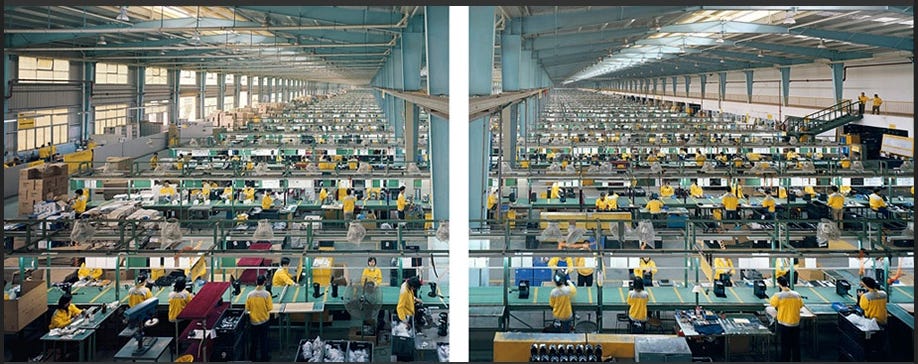Did It Matter?
Classes finished up last week. One of the things I was teaching this semester was undergraduate economic history, which I hadn't done in some years.
Our main books this time were Beckert’s Empire of Cotton, which I’ve used several times in this class; and Jonathan Levy’s Ages of American Capitalism and Joshua Freeman’s Behemoth, neither of which I had read before.
Behemoth is a history of the factory; the final chapter is on present-day factories in Vietnam and China, which are probably the largest factories that have ever existed. It’s a fascinating account, with a lot of details I hadn’t heard before. I was astonished to learn, for example, that all the iPads are made at a single facility in Chengdu.
A more interesting question is why these factories are so big. The answer, Freeman stresses, is not any sort of technical advantage. These giant factories in general are organized with small groups of workers doing the same tasks in parallel, independently of each other; there’s nothing like the division of labor that you have on an auto assembly line. Rather than economies of scale, he argues, the main reason production is concentrated in a few giant factories is to allow them to be more responsive to the changing demands of their clients, the Western companies whose subcontractors they are. As with giant factories through history, the impetus for concentrating workers in one facility is about centralizing authority and not just technical efficiency, as people like Stephen Marglin and David Noble (or Levy in his chapter on River Rouge) have emphasized.
A question I posed to the class is: Is there any connection between China’s industrial success today and their earlier revolution? Is the fact that China had one of the 20th century's greatest political revolutions connected to the fact that it is one of the 21st century's greatest industrial-policy success stories? There was a bit of debate on this – some people pointed to the uniquely egalitarian organization of earlier Chinese factories, where workers discussed how to organize production, and even managers were required to spend time doing routine manual work. But others noted, correctly, that Foxconn isn’t anything like that – there are bosses who give orders just like everywhere else.
The picture you get from Behemoth and other careful accounts of modern Chinese factories is, in many ways, of a country that is following the same path that was blazed in Manchester and Lowell and Detroit, albeit on a larger scale. This is, of course, a useful corrective to hysterical claims about industrialization based on slave labor and market manipulation, from people who ought to know better. But it's a bit distressing if you would have hoped that the titanic struggles of the Chinese Revolution might have opened up a different road.
One way to think about whether, or how, the revolution mattered, I suggested, is to think about the counterfactual. We could look back at China 100 years ago – backward, riven by civil war, subjugated by Europe and Japan, desperately poor – and think that only some kind of radical political project could have rebuilt the country. Or in a longer view, we could say that for most of recorded history China has been one of the most advanced, prosperous and politically stable regions on Earth, so it’s hardly surprising that it would be returning to something like that position. Which of those seems more reasonable?
After they’d gone back and forth on that for a while, I asked them if they knew what major battle we’d just passed the 70th anniversary of. No one knew; I wouldn’t have expected them to. It’s Dien Bien Phu, I said. The decisive defeat of the French by the Viet Minh, the moment when Europeans were shocked to discover that they could be defeated by a backward, non-Western people in open battle. It was a major step in Vietnam’s road to full independence, and to the end of colonial empires all over the world – one of the most important battles of the 20th century. One of the biggest victories, one might say, for the liberation of humanity. And yet now Vietnam is manufacturing shoes for Nike just like everyone else.
So, did it matter? In the long run, do these titanic struggles between classes and nations make any difference? Do they really change how production is organized, and for what, and by whom?
I ended the class there. But one might add that how you feel about whether Dien Bien Phu is worth commemorating is probably as good a marker as any of the boundaries of radical politics. Does progress come through struggle -- sometimes violent, always disruptive against the established order? (And in these struggles, has America and "the West" been on the side of human liberation, or the other side?) Or does progress, if it happens, happen incrementally, on its own, regardless of who wins the battles?



I think this is a great piece. These ideas have been part of my political evolution because I increasingly find the argument “it mattered” less and less convincing. If anything, “it” was often a setback against gdp growth.